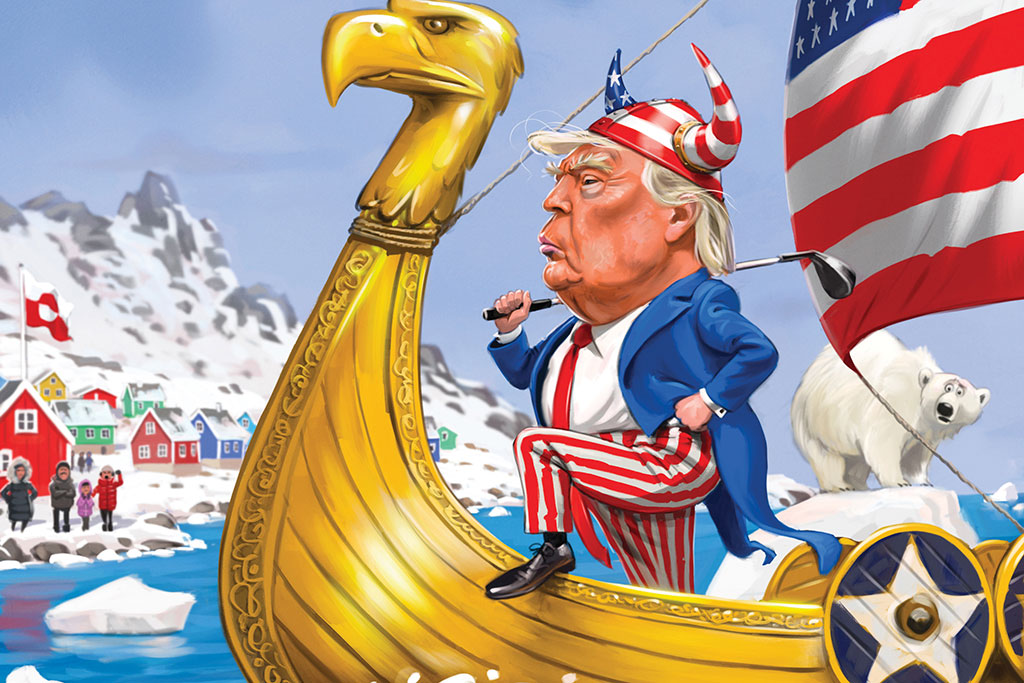'Capitalism is suffering death by a thousand cuts': Ruchir Sharma talks to MoneyWeek
Ruchir Sharma, author of What Went Wrong with Capitalism, explains how free enterprise in developed economies has been undermined by continual state interference


Get the latest financial news, insights and expert analysis from our award-winning MoneyWeek team, to help you understand what really matters when it comes to your finances.
You are now subscribed
Your newsletter sign-up was successful
Want to add more newsletters?

Twice daily
MoneyWeek
Get the latest financial news, insights and expert analysis from our award-winning MoneyWeek team, to help you understand what really matters when it comes to your finances.

Four times a week
Look After My Bills
Sign up to our free money-saving newsletter, filled with the latest news and expert advice to help you find the best tips and deals for managing your bills. Start saving today!
Andrew Van Sickle: The developed world has a growth and productivity crisis. Taxes are high, there is growing concern over income and wealth inequality, and the statist populist right and populist left are in the ascendant. Many people think capitalism has failed. You have a different take.
Ruchir Sharma: One of the reasons I wrote this book is that in 2019, there was a survey saying that young Americans thought socialism was preferable to capitalism. That struck me as a hugely significant: I grew up in India, which used to be a socialist country, and I experienced the adversity caused by socialism.
The young typically revolt against whatever the current system is. The current system is labelled as capitalism, but if you look closely, you see that the system we have in place today is, at best, a very distorted form of capitalism. My book explains why.
MoneyWeek
Subscribe to MoneyWeek today and get your first six magazine issues absolutely FREE

Sign up to Money Morning
Don't miss the latest investment and personal finances news, market analysis, plus money-saving tips with our free twice-daily newsletter
Don't miss the latest investment and personal finances news, market analysis, plus money-saving tips with our free twice-daily newsletter
The essence of capitalism is to give people as much economic freedom as possible. The government’s role is really just that of a traffic cop. It is not supposed to keep interfering. But over time, it has expanded its role more and more. In the two centuries before the 1920s, there was no welfare state in most countries, and government spending was minuscule, around 3% of GDP. Since the 1930s, there has been a steady expansion in the role of the state.
That is especially true of the last 30 or 40 years; the neoliberal era. It is remembered as a time of deregulation and trade liberalisation, with financial markets dominating the news. But state spending as a share of GDP crept upwards. It barely paused under Thatcher and kept climbing under Reagan. In the US, it’s fast approaching 40%; in France, it’s close to 60%. One can hardly call a country capitalist at that level of statism. Regulations have proliferated, too. In the last 20 years or so, the US has introduced 3,000 new regulations a year, but only withdrawn 20. Then the culture of bailouts became entrenched.
Andrew Van Sickle: When did it start?
Ruchir Sharma: The first big bailout of a financial institution was that of Continental Illinois, a bank, in 1984. A ratchet effect soon set in, with each subsequent bailout becoming bigger. Then there was the Greenspan put. In 1987, he intervened explicitly to prop up the stock market. That had never been done before, and it set a crucial precedent.
Andrew Van Sickle: Hence LCTM, the dotcom era and the banking bailouts, all a result of interest rates being too low and blowing up bubbles.
Ruchir Sharma: In 2023, we reached the stage of preventative bailouts. Silicon Valley Bank was rescued in case it caused contagion. Risk has become socialised. This is not capitalism, a key element of which is that companies must be allowed to fail.
Andrew Van Sickle: It is a key vulnerability for those of us who are pro-capitalism in principle, because it is socialism for the rich. In the same vein, one of the side-effects of interest rates being artificially low is that we have zombie companies, unprofitable but clinging on, refusing to allow Schumpeterian creative destruction.
Ruchir Sharma: Zombies, according to the Bank for International Settlements, are those that have not even made enough profit to service their debt for three years in a row; they’re forced to go back to the market to keep raising more debt. They are a bigger problem in Europe than in the US.
The phrase was coined in the 1990s when Japan had many zombie firms, and at that stage, the Western media were saying: “This doesn’t happen in Europe and the US.” But even then, the share of zombies in the US and UK was about 2% or 3% of listed companies. Now, the figure in developed stock markets is 10%. In the US and UK, respectively, it’s 20% and 22%.
Andrew Van Sickle: There is also an interesting section in your book about how competition has been undermined by capitalism being hampered.
Ruchir Sharma: Yes, when it comes to a lack of competition and monopolies, I think the US is even worse than Europe.
Andrew Van Sickle: How so?
Ruchir Sharma: Strong lobbying and a weak antitrust environment.
Andrew Van Sickle: I read elsewhere that in the 1980s, regulators started to skew towards whether a merger could lower prices for consumers, which meant lots of mergers were waved through. There are only two beer companies in the US now. How can this unhealthy market concentration be rectified?
Ruchir Sharma: Just breaking firms up or making their life harder with new rules is not going to be a lasting solution, as they may just grow bigger again or get around the rules. Look at the banking sector. After the crash, we had a lot of regulation, but now the so-called shadow banking sector, where companies can borrow money from various private entities, is proliferating. So, sectors can adjust to regulation.
The other problem is that new rules are a boost for incumbents. They can afford the cost of compliance – smaller, potential rivals can’t. Small rivals can’t afford lobbyists, either. Big Tech firms are rising fast in the halls of power, both in Washington and Brussels, and now account for five of Europe’s ten biggest-spending lobbyists. Consider that in the US, the cost of setting up an investment fund has soared tenfold in the past two decades. This has prompted people to give up and join larger funds, making the market concentration problem bigger.
Andrew Van Sickle: What’s the solution?
Ruchir Sharma: A key move would be to stop these companies from buying smaller ones. They have access to cheap capital and huge war chests. If they see companies becoming a threat, they can just pre-emptively buy them. Stopping that would certainly help.
Then we must get the cost of regulation down so that it is not prohibitive for small companies to set up. These measures should temper the impact of big companies’ lobbying, too.
Andrew Van Sickle: Zooming out a bit, the consequence of all this regulation and interference is a very top-down development model. In this country, it is illustrated by a very heavy-handed green policy. Is this a universal problem?
Ruchir Sharma: I wouldn’t single out specific sectors in this regard; to me, it seems that the overriding imperative is to spend as much as possible on everything: on defence, industrial policy, you name it. What we need is an efficient state that prioritises sensible things.
Andrew Van Sickle: We may have to pin our hopes on a productivity miracle through AI?
Ruchir Sharma: It seems to me that all this government interference in the economy is negating all the advances in technology we have seen – the improvement in PCs, the advent of the internet, and so on. That is the reason we are not seeing a large productivity boost.
We are soaked in debt, 20% of all listed companies are zombies, big companies (hardly known for productivity) dominate, and you have declining social and economic mobility. All these explain why productivity growth is low and stagnant, virtually, in the UK and Europe.
Andrew Van Sickle: This might explain why we haven’t seen much of a kick from AI yet? It sounds as though governments could throttle it before it gets going. Is there anything more specific you think governments should do now to get things going?
Ruchir Sharma: No; as I say in the book, it’s about looking at other countries where the state is efficient, with good outcomes. In the book, I highlight examples like Taiwan, Singapore, or Korea, where governments are tech-savvy and highly efficient, building a state for the 21st century. Taiwan is an impressive example I explore in the book. Switzerland is also worth studying. It’s very rich, state spending is relatively low, and its economic model is heavily decentralised. There are 26 cantons, each with a great deal of autonomy.
Andrew Van Sickle: One headwind governments have, as you note in the book, is demographics. This is part of the growth problem, too.
Ruchir Sharma: There are two drivers of economic growth: population growth and productivity growth. Global growth never really got going until populations started growing in the 1800s, a result of advances in medicine. Then, productivity growth took off with the first industrial revolution. Then, after 1945, we had the baby boom. So we had a post-war golden era of growth.
But growth began to slow down in the 2000s, while population growth peaked a few years earlier. Now both productivity and population growth, especially working-age population growth, has slowed. There are now 50 countries in the world where the working-age population is shrinking.
Yet politicians keep insisting we can return to a golden era of growth; in the US, they talk about a 3% or 4% rise in annual output per year, and 5% in China. The latter is especially unrealistic. No country can grow by 5% if its overall population (not just its working-age population) is shrinking.
It’s a case of recency bias and anchoring bias. Most people’s, certainly politicians’, perspective is skewed by the fact that they grew up in a 50-year golden age for economic growth – a time when population growth worldwide was expanding by 2% a year or so.
This article was first published in MoneyWeek's magazine. Enjoy exclusive early access to news, opinion and analysis from our team of financial experts with a MoneyWeek subscription.
Get the latest financial news, insights and expert analysis from our award-winning MoneyWeek team, to help you understand what really matters when it comes to your finances.

-
 Should you buy an active ETF?
Should you buy an active ETF?ETFs are often mischaracterised as passive products, but they can be a convenient way to add active management to your portfolio
-
 Power up your pension before 5 April – easy ways to save before the tax year end
Power up your pension before 5 April – easy ways to save before the tax year endWith the end of the tax year looming, pension savers currently have a window to review and maximise what’s going into their retirement funds – we look at how
-
 How Canada's Mark Carney is taking on Donald Trump
How Canada's Mark Carney is taking on Donald TrumpCanada has been in Donald Trump’s crosshairs ever since he took power and, under PM Mark Carney, is seeking strategies to cope and thrive. How’s he doing?
-
 Why does Trump want Greenland?
Why does Trump want Greenland?The US wants to annex Greenland as it increasingly sees the world in terms of 19th-century Great Power politics and wants to secure crucial national interests
-
 'Investors should brace for Trump’s great inflation'
'Investors should brace for Trump’s great inflation'Opinion Donald Trump's actions against Federal Reserve chair Jerome Powell will likely stoke rising prices. Investors should prepare for the worst, says Matthew Lynn
-
 The state of Iran’s collapsing economy – and why people are protesting
The state of Iran’s collapsing economy – and why people are protestingIran has long been mired in an economic crisis that is part of a wider systemic failure. Do the protests show a way out?
-
 Why does Donald Trump want Venezuela's oil?
Why does Donald Trump want Venezuela's oil?The US has seized control of Venezuelan oil. Why and to what end?
-
 Market predictions for 2026: Will Dubai introduce an income tax?
Market predictions for 2026: Will Dubai introduce an income tax?Opinion My 2026 predictions, from a supermarket merger to Dubai introducing an income tax and Britain’s journey back to the 1970s
-
 The war dividend – how to invest in defence stocks as the world arms up
The war dividend – how to invest in defence stocks as the world arms upWestern governments are back on a war footing. Investors should be prepared, too, says Jamie Ward
-
 Did COP30 achieve anything to tackle climate change?
Did COP30 achieve anything to tackle climate change?The COP30 summit was a failure. But the world is going green regardless, says Simon Wilson